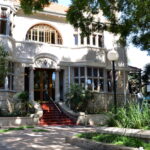Day 2 of our FDIB trip was about education—from both the top and the bottom. The “top” was the visit to the University of Witwatersrand School of Business; the dean said of the two top schools in South Africa, the University of Cape Town where we visited last year had better scenery. His

school, he claimed, had the better scholars. Whatever the claims, he certainly had the nicer building (UCapetown school of business is housed in a former prison); it’s located on the business and governance campus in one of the swankier areas of town. The area was populated after 1900 by the so-called Randlords, the beneficiaries of the gold strike at Witwatersrand. The administrative building is a baronial style mansion built by one of the founders of South African Brewing.
The two hour session introduced us to higher education on the continent of Africa, in an up-to-date building whose library contained 4 terminals dedicated to Bloomberg services that IWU was told would cost us $12000 a month! The Dean welcomed us with a brief background of what makes the school distinctive, including its part (UW’s, anyway) in the protests against apartheid, which led in the early 1990s to one of the first visits to a campus from Nelson Mandela, who thanked the students for their protests against the segregation.
Student protests seem to be part and parcel of current campus life now, too. I’ve read about protests to change the names of the buildings, and the

removal of the Cecil Rhodes statue from the Cape (he gave the land on which it is built), and the protests against higher fees. On one bulletin board was posted an unusual court order, enjoining about a dozen students from engaging in any disruptions of the “Senate House” or the campus in general. Increasing fees seem to be part of the stimuli.
The Dean (and his faculty) stressed the challenges of doing business in Africa, and, in particular, the challenges of teaching business. The school has gone to a program with a lot of application—there was advertised a short course (management development seems to be a specialty—and a profit center for the University) with a week at the London School of Economics, followed by stops in Dubai and Singapore, and a focus on being involved in African business beyond South Africa. WSB has introduced a number of imaginative Master’s courses, in design creation, for example, arguing that a school in Africa has to teach more than the traditional business programs—with 36% unemployment (official figures released this week), and a government known for corruption, and multinationals probably incapable of making a dent in unemployment (mining, which once employed about 65% of the workforce has suffered catastrophic declines), the school’s faculty and administrators have chosen to advance education (about other countries—the MBA students must go on visits to other countries in Africa), and give people the tools they need. The dean noted that of the 17000 schools of business, Wits ranks 3rd in the number of CEOs it has produced.
As I said, the theme was education, and the latter half of the day, we visited a social entrepreneur—in education. We went to a library that he had gotten money from the Mayor to equip with computers—and to create a MOOV (massive online varsity, he called it), that is housed in about a dozen libraries around Johannesburg. The organization provides “facilitators” (we met many of them), whose job it is to introduce people to computers and to become literate in either business or computer skills so as to become employable. The “students” (I think it’s all free) can sign up for a training class on how to (for many the first time they’ve used a computer—computer literacy on the continent is 13%). They take probably 3 courses, using the library based-computers, earning an employable certificate of competence in computers or marketing or finance. The young man who started it told us he was an academic economist who “wanted to make a bigger difference.”
His challenge was highlighted by the news that the library had been robbed earlier this morning—the robbers took the technology, not books—the township is one of the roughest in Johannesburg. I thought I was seeing what Clayton Christensen described as “Disruptive Innovation” in higher education; he thinks the internet will force the change in the model, but one thing our speaker said gave me hope—as an academic—that the current model is broken but not yet ready for the scrap heap; his main goal is to find a university to give credit for these certificates. What he was saying, in effect, was that universities provide validation for learning—and sometimes make it possible. New tools offer new opportunities as well as threats, even in libraries in townships in South Africa.
It’s hard to imagine that one of the top two most prestigious schools in the country uses a former prison as one of its buildings. It makes you more thankful and realize how lucky we are here in the United States.